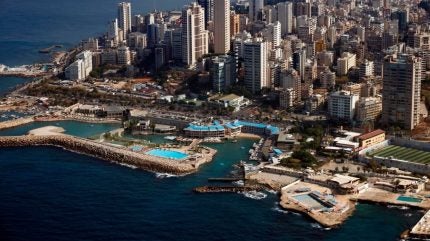

The past decade has not been easy for Lebanon. Already a fragile country ravaged by sectarianism, the Syrian civil war has been further destabilising the small Mediterranean nation since 2011. Consequently, large flows of investment have halted from one of Lebanon’s key sources of capital, the Gulf Cooperation Council countries.
It is no surprise, therefore, that foreign direct investment (FDI) to the country has plateaued since 2012, averaging about $2.4bn annually over the past eight years, according to data from the UN Conference on Trade and Development World (UNCTAD).

Discover B2B Marketing That Performs
Combine business intelligence and editorial excellence to reach engaged professionals across 36 leading media platforms.
That latest UNCTAD statistics on Lebanon show that, in 2019, FDI dropped to its lowest level since 2002, mostly due to an unprecedented (and ongoing) financial crisis that began in August of that year.
As a result, mass protests rocked the country for several months from late 2019. The situation went from bad to worse in 2020 following the outbreak of Covid-19 and the explosion at Beirut port, one of the strongest non-nuclear blasts ever recorded.
It is highly likely, therefore, that FDI into Lebanon will have fallen even further in 2020. The country has now become the first in the Middle East and North Africa to be gripped by hyperinflation – drawing strong parallels with Venezuela. Lebanon is also the third most indebted nation in the world in terms of the debt-to-GDP ratio.
Lebanon attracts FDI amid unrest
Despite the underlying political unrest of the past decade and more, the Lebanese economy has still managed to attract significant foreign investment. For example, even in 2019 the country brought in the sixth-highest amount of FDI capital out of all nations in western Asia, following behind the likes of Israel, Saudi Arabia, Turkey, the United Arab Emirates and Oman, according to data from UNCTAD.

US Tariffs are shifting - will you react or anticipate?
Don’t let policy changes catch you off guard. Stay proactive with real-time data and expert analysis.
By GlobalDataThe main investors in Lebanon come from France, the UAE, the US, Germany, the UK, the Netherlands, Jordan and Egypt, and investment has been mainly oriented towards ‘trade’, real estate, services, tourism and agriculture (in that order), according to Lebanon’s investment promotion agency, IDAL.
Although the country is beginning to develop its nascent oil industry, its main selling point to investors over the past two decades has been a favourable geographic location, a strong banking sector and stable currency (until 2019), an upper-middle income population, and a well-educated, multilingual and digitally literate workforce.



